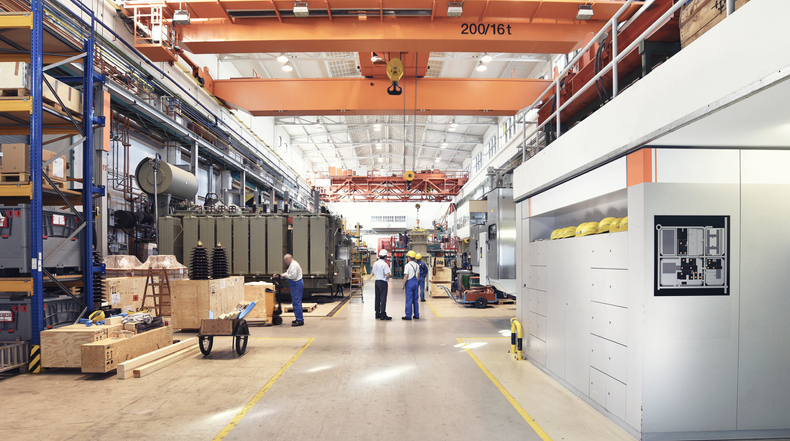Tag: construction school
5 Opportunities For Advancement After Construction College
October 04, 2022
Learning the core principles of electricity and construction is a great way to begin your career. However, you may be wondering exactly how you might continue to advance your career after graduation. Work is often more satisfying when there are opportunities to progress and seek higher, more lucrative positions for yourself. Luckily, you have many options at your disposal when you train as a Construction and Maintenance Electrician with the North American Trade Schools. Below, explore five great opportunities for advancement available with the skill set you’ll gain during your program.
1. Start an Electrical Apprenticeship to Open Doors in Your Career
Electrical construction is a lucrative and interesting field with many opportunities for career advancement and many different work environments to choose from. To open doors in this field, you should first enrol in an electrical apprenticeship after construction college with NATS. This way, you’ll gain all of the hands-on experience you’ll need to wire industrial or residential buildings safely and effectively. When looking for an apprenticeship, do your research and select a reputable company that consistently leaves customers satisfied. You’ll want to learn how to be an outstanding electrician first in order to continue advancing your career.

2. Become a Journeyman Electrician After Construction College
A journeyman electrician is qualified to work on all sorts of electrical systems. The job includes installing, repairing, and maintaining these systems within various settings. After completing your training, taking a four-year apprenticeship, and completing 6000 hours of technical, on-the-job training, you’ll be equipped with the skills for this career. The experience you gain in this position will prepare you to become a master electrician, which will significantly increase opportunities for growth and earning potential.
3. Consider Becoming an Electrical Inspector
After you’ve been working in the field for some time and have developed a degree of expertise, you might consider becoming an electrical inspector. The position involves inspecting generating systems, appliances, electrical wiring, and motors. You’ll work primarily on construction sites and in homes, ensuring that electrical systems are up to code and in good working condition. An electrical inspection may also involve making repairs to bring systems up to standard.

4. Are you a Good Teacher? Become an Electrical Instructor
Once you’ve gained confidence in your skills after graduating from construction school, instructing is a great option. This career path is very rewarding as you can use your knowledge and experience to help others pursue a career they’re passionate about. Responsibilities include planning and preparing learning materials, teaching the core principles of electrical technology, and adapting teaching methods to meet the needs of each student. In some cases, you may be asked to contribute to program planning.
5. Work For Yourself as a General Contractor
Have you always wanted to try your hand at business? You’re certainly not alone. Entrepreneurship can be extremely lucrative and fun, especially in the construction sector! Once you’ve become a master electrician, which involves three years of field experience and passing a licensing exam, you can run your own electrical company and enjoy the freedom and limitless possibilities that come with entrepreneurship. General contractors have the opportunity to work in industrial, commercial, and residential environments, depending on what clients they cater to.
Ready to start your path in one of the construction careers?
Contact NATS for more information!
5 Soft Skills Necessary for Success in Construction Careers
August 23, 2022
Construction careers are multi-faceted and they often require workers to wear multiple hats and carry out a wide variety of duties. In addition to practical construction skills, there are several soft skills that can boost your ability to reach your career goals. The soft skills you’ll develop in training and on the job sites will help you create the right mindset to face workplace challenges head-on. Let’s explore a few of them!
1. Effective Communication Skills Are a Must for Efficiency on Site
Effective communication is the key to a productive construction site. It involves being able to listen, understand, and express yourself accurately and clearly. There are several types of communication that every aspiring construction worker should master. Not only will you need to have the skills to coordinate with your co-workers but also with clients and different people across the supply chain. Each type of interaction requires you to communicate differently.
2. Use Your Knowledge from Construction College to Develop Problem-Solving Skills
Throughout your construction career, you’ll likely be required to come up with solutions to pressing issues on the spot. This certainly takes practice, but with the right training from a construction college and some experience under your belt, you will have the knowledge you need to quickly weigh the pros and cons of different solutions and make the right decision for the issue at hand. Want to develop a mind for problem-solving? You’ll have the chance to exercise these skills in our Construction & Maintenance Electrician Pre-Apprenticeship program where you’ll learn to come up with different home wiring solutions, how to interpret codes, analyze and repair machine controls, and more.

3. Mental Clarity and Focus With Stress-Management Skills
In a construction career, there will be a lot going on around you and often many different tasks will demand your attention at once. Though this is the perfect work environment for someone who likes a dynamic, hands-on work life, you’ll certainly experience some stress from time to time. Your ability to manage it will determine the extent to which you can perform your duties with mental clarity and focus. You can practice stress management throughout construction school by managing your time well, practicing self-care, and asking for help when you need it.
4. Be Flexible and Adapt to Work Through Inevitable Setbacks
As we discussed, construction sites can get very busy and on any given project, there’s a possibility that something will go wrong–or at least not exactly according to plan. In situations like these, it’s important to be able to quickly adapt to new circumstances and work with whatever you have at your disposal to get the job done. Your team will certainly appreciate your ability to switch gears and prioritize tasks sensibly when setbacks arise and you’re prepared to relocate when needed.

5. Have Commercial Awareness to Ensure Profitability
Whether you plan to run your own construction business or be a valued team member, understanding commercial demand will help you produce results that clients are happy with. In addition, commercial awareness helps you adapt to market trends and world events that may affect the construction industry. One way to improve in this area is to regularly keep up with construction news. In addition, by getting trained with us in both the classroom and in practical labs, you will learn everything you need to perform construction work up to an industry standard.
Ready to start training in one of the construction careers?
Contact NATS for more information!
Exploring Construction Careers? Ways to Promote Sustainability in the Field
July 19, 2022
Caring for the environment is becoming increasingly more important, making sustainable construction a key part of the process. According to research, annual global construction waste is anticipated to reach 2.2 billion tons by 2025. Professionals in construction careers can embrace sustainable practices to reduce this number and make a positive difference.
Sustainable construction can typically be viewed as any kind of construction practice that serves to reduce its impact on the environment. Typically, this involves being environmentally conscious when starting construction projects—choosing the right materials and methods to minimize energy consumption or waste production.
Read on to learn about how professionals in the industry can embrace sustainability and contribute to protecting the environment through their work.
Selecting Environmentally-Friendly Construction Materials
Before starting a construction project, professionals can begin by selecting sustainable materials. These materials do not negatively impact the environment nor do they play a role in draining natural resources. Here, it’s best to avoid using non-renewable and scarce materials and prioritize reclaimed materials over new ones.
Professionals can consider using bamboo, recycled plastic, laminated timber, ferrock and hempcrete when constructing green buildings—ones that are environmentally responsible and resource-efficient. It’s also good practice for professionals in construction careers to aim for using fewer materials and opting for ones with low embodied energy. By taking on this approach, construction professionals can reduce their energy consumption, better protect the environment and decrease the carbon footprint of their projects.

Embracing Sustainable Construction Methods After Construction School
Prefabricated construction, also referred to as offsite or modular construction, is when parts of a structure are assembled at a manufacturing site before being transported to their final destination. This technique is considered to be more sustainable as it promotes factory-based manufacturing with more affordable operating costs.
In fact, it’s even been noted that this construction method uses up to 67% less energy than a traditional site. Because manufacturers would be more able to accurately estimate the necessary materials, they can reduce waste by 50% compared to conventional construction.
Interestingly, buildings developed using the prefabricated approach can even be recycled and repurposed over time, ultimately reducing waste. Students in construction school can embrace these methods in their careers to build a more sustainable future.

Managing Construction Waste With the Environment in Mind
Reducing waste is a key way to promote sustainability in construction. This can be done by carefully planning waste management efforts, anticipating potential waste, preparing sufficient bins for separating waste, estimating the right amount of materials and identifying recyclable materials.
Another valuable approach is to prioritize deconstruction over demolition. That’s because demolition is typically more destructive, preventing professionals from preserving reusable materials. By opting for deconstruction, professionals can disassemble structures to salvage reusable materials and save them for future projects. Adopting these approaches and taking active measures to promote sustainability in the field can help reduce our impact on the environment.
Thinking of attending a construction college?
Contact NATS for more information!
4 Interview Questions to Expect After Construction School (& How To Answer Them)
September 16, 2021
Ready to launch your career as a construction electrician? Preparing for your job interview is one of the best ways to increase your chances of success. When you arrive at the interview stage, your potential employer has already seen your resume. This means they already know you have the skills and experience necessary to take on the job at hand. So what’s the point of an interview? It’s your golden opportunity to show an organization that you’re not only a good fit for the role you’re applying for on paper. You’ll get to tell them why you’re perfect for the job based on your character, commitment, work ethic–and any other professional talents you think they need to hear about!
Below, discover four common interview questions that you should prepare to be asked when applying for a job as a construction electrician.
1. What Made You Choose a Career in Construction?
Employers want to know what motivated you to enter a career in construction, as this will tell them more about who you are as a person and how committed you are to the industry. When answering this question, it’s important to be honest–while emphasizing why you’re passionate about working as a construction electrician. Did you always know you were going to become an electrician? Tell your potential employer why. Do you enjoy being challenged and solving complex problems? Don’t forget to let your interviewer know what excites you about this career path. By answering honestly, your passion for the role will shine through–which will impress prospective employers.

2. What Do You Know About Our Company?
In almost any field, it’s likely that an interviewer will ask a candidate what they know about their company. This question is meant to test your knowledge of the organization you’re applying to work for. Interviewers want to know that you’ve researched their company. This demonstrates your interest in the position and let’s them know that for you, this isn’t just another job. Prepare for this question by conducting plenty of research on the company before arriving at the interview. You’ll want to familiarize yourself with the organization’s mission, values, their history, the services they offer, and any other relevant information.
3. Where Do You See Yourself in the Next Five Years?
If you’re interviewing for a position in the construction trades after completing your training, you’ll want to come to an interview prepared to explain your future career plans. A hiring organization wants to know that the person they’re planning to hire has an idea of how they want to advance throughout their career. When answering this question, talk about how the position you’re applying for will equip you with the skills you’ll need to succeed in attaining your career goals. Showing your potential employer that this job is a step in the right direction for you assures them that you’ll be committed to their organization for a longer period of time.

4. Do You Have Any Questions for Us?
Don’t mistake this seemingly “easy” question for one that isn’t important. When an organization asks an interviewee whether they have any questions, they’re gauging your interest in the role. Coming prepared for an interview with a list of questions based on the research you’ve conducted is a great way to show an organization that you’ve given this opportunity plenty of thought. Asking questions also shows that you’re taking the process seriously.
Before your next interview, study these questions and come up with some thoughtful answers. When you arrive prepared, you’ll be sure to succeed!
Are you considering attending construction school?
Launch your career with a program at the North American Trade Schools today!
The Most Sustainable Construction Materials for Those in Construction School
September 08, 2020
Plenty of work has been done over the last few years to make the construction of necessary buildings more sustainable. That includes taking a look at the construction materials themselves. There are different definitions of sustainability in terms of construction materials. It could refer to products that are locally sourced, how resilient a product is, or how much energy it takes to produce it.
Some professionals are looking at material sustainability as a concept that considers all the energy required to extract a material, produce it, and transport it. They also look at its appropriateness for the environment, the rate at which it degrades, and how often it needs to be replaced. Some construction professionals are also moving towards sustainability by incorporating recycled materials. Read on for a few examples of sustainable materials!
Bamboo Could Dominate the Construction Trades
Bamboo is a construction material with a lot of potential. It can be used in walls, flooring, or furniture, and its benefit is that it is extremely durable and strong. It has a greater compressive strength than even bricks or concrete. Its high strength-to-weight ratio means that it is relatively lightweight and takes less energy to transport than many other materials.

Bamboo is a perennial grass and can be found on several continents. Currently, it is mostly grown in South America and Asia. As a grass, its extremely quick rate of self-generation helps its sustainability. It continues to spread and grow without the need to replant it after harvesting it. Professionals with a career in construction should be aware of one potential downside to using bamboo: it requires treatment to make it resistant to insects and rotting.
Sheep’s Wool Is A Natural Construction Material
Sheep’s wool is a material that has been used for all kinds of things for hundreds of years. These days, it can still be beneficial for the construction industry. Sheep’s wool is naturally insulating. And, while it’ll still need extra treatment to make it properly safe with regards to fire risks, it is a material with a naturally high ignition temperature. As a result, it can be an energy-efficient insulator used in walls, ceilings, and attics.
One of the sustainable benefits of sheep’s wool is that it has similar properties to mineral wool or glass wool but requires less energy to produce. It is, of course, naturally regenerating. One of the potential downsides to using this material is that it requires treatment to prevent the infiltration of insects and fungi.
Cork Doesn’t Have a Significant Environmental Impact
Cork comes from the tree bark of the cork oak. After construction school, professionals can use this material as flooring or sub-flooring. It’s very flexible and resilient, a good thermal insulator, and efficient at absorbing noises and shocks, making it an effective construction material.

The benefit of this material is that it’s sourced entirely from natural sources. The cork oak will continue to grow and reproduce the material after it is extracted from it, making it a sustainable resource to use within the construction industry.
Do you want to make your entry into the construction trades?
Contact North American Trade Schools for more information!
3 Steps to Starting Your Own Business after Construction School
April 07, 2020
If you are business-minded with an entrepreneurial spirit, you might be considering starting your own business after graduating from a construction program. Business owners can enjoy a flexible schedule, ample learning opportunities, and competitive remuneration.
However, starting a business is far from simple. Even the best construction worker in the world will need to conduct market research, have a basic understanding of finance and accounting, and learn about law and marketing.
Read on to find out more about what it takes to start your own business after construction training.
Step 1: Do Your Research
Before even thinking about launching your own business, you will need to conduct in-depth market research to establish demand and rates. Is there demand for another construction business in your area? How much are people paying on average for typical projects?
If you have any friends or acquaintances working in the industry, make sure to ask them for any insights. You could also do some research online and use social media to identify your main competitors, or even conduct surveys and organize small focus groups.
Use this research to form your business plan and identify your unique selling point (USP). What can you offer customers that no one else can? Is it a better price point? Or expertise in one particular area? Whatever it is, use it to your advantage in a career in construction.

Step 2: Prepare an In-Depth Business Plan for Your Career in Construction
Once you’ve done your research, you’re ready to write your business plan. Make it as detailed as possible,marking out your goals for each month and including estimated annual turnover and gross profits. This will be particularly useful if you need to apply for funding from a financial institution.
This should also give you an idea of how much money you’ll need to get started. After studying at construction school, you should have a good idea of all the tools and equipment you’ll need to work as an independent construction worker.
Calculate how much you’ll need to invest in these, as well as in vehicles, marketing, and software. It can take a while for any new business to start making money, so make sure you have a cushion for the first few months.
You’ll also need to decide who you want to work for. Do you want to work for residential property owners or businesses? Are you looking for small jobs or bigger, long-term projects? As well as this, how many staff will you need to hire? Or will you choose to work with contractors? Thinking about these things early on will help you form a clearer picture in your mind of what your business will look like, and what you need to do to get it off the ground.
Step 3: Check the Paperwork
As with any new business, you will need to make sure that you’ve completed all of the necessary paperwork correctly. You will need to register your business for an EIN, and have all the right licenses and permits. You will also need to get insurance to protect yourself and your business.
If you’re concerned about legalities or taxes, it might be a good idea to hire a lawyer or an accountant. You could be the best construction worker in the world, but if you can’t take care of the administration of your business, it won’t go far!

Do you want to learn more about construction trades?
Contact North American Trade Schools for more information!





